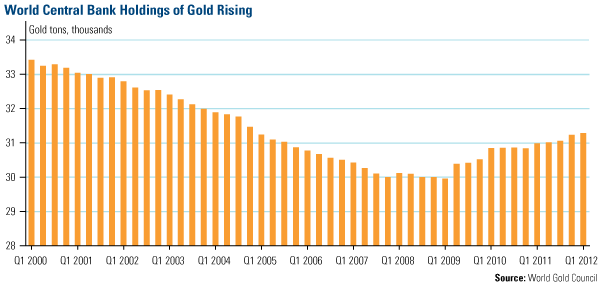Gold Market Radar (June 18, 2012)
For the week, spot gold closed at $1,627.10 up $33.65 per ounce, or 2.11 percent. Gold stocks, as measured by the NYSE Arca Gold Miners Index, gained 1.20 percent return. The U.S. Trade-Weighted Dollar Index fell 1.11 percent for the week.
Strengths
- Gold ETFs bullion holdings are closing in on levels held by sovereigns, such as France and Italy. Gold bullion ETFs held 2,396 tonnes at the end of the first quarter of 2012, which is up 278 tonnes from the prior year, and is just 1.6 percent shy of the 2,435 tonnes held by the Bank of France and 2.3 percent below the 2,452 tonnes held by the Bank of Italy.

- Interestingly, central banks continue to buy gold. The World Gold Council estimates that as of the end of the first quarter of 2012, central banks have purchased almost 300 tonnes of gold over the trailing year, led by the central banks of Turkey (+93 tonnes), Russia (+85 tonnes) and Thailand (+44 tonnes). This equates to approximately 11 percent of world mine production and continues a significant change from the past, when central banks were net sellers of 400-500 tonnes annually.
- Chinese gold imports from Hong Kong totaled 239 tonnes in the first four months of the year, up a staggering 782 percent year-over-year. No wonder the current issue of Barron’s has an article showing how central banks have been big buyers of gold lately (see Simon Constable’s column). As David Rosenberg, of Gluskin Sheff, pointed out this week, the central banks know that the need to inflate massively in coming years is going to make the yellow metal an increasingly desirable asset (talk about betting on your actions!)
- The deputy chief executive officer of Turkey’s biggest bank by assets said they plan to collect $1 billion of gold in its deposit accounts by the end of the year. It is believed that as much as 5,000 metric tons of gold is stored “under the mattress” in Turkey. Gold deposit accounts have surged to 13.6 billion liras ($7.4 billion) from 3.1 billion liras within the past year, according to data released by the banking regulator. Gold has always been seen as money and as a store of wealth in Turkey and now the country is leading the way with regards to the remonetization of gold in the 21st century.
Weaknesses
- Fred Hickey, who writes The High-Tech Strategist investment newsletter, noted in his recent monthly letter that while China is a major buyer of gold bullion, they rarely buy gold mining stocks and this is one of the main reasons for the record gap in the performance of gold versus the gold mining stocks. Fred further notes that principal buyers of gold stocks are U.S. investors who are complacent, delusional and believe that the U.S. government’s paper based dollars are a “safe haven.” At some point though, Fred believes this crowd of investors will lose faith and will be searching for cheap ways to own gold and there is no cheaper way to own gold than by owning gold stocks.
- Kevin Norrish, managing director for research at Barclays, says the latest fall in commodity prices in aggregate for the second quarter is the worst in recent memory. The rapid decrease has outstripped numbers recorded since 2007 and Norrish is of the opinion that the decline has been overdone, which bodes well for the second half of 2012.
- In a news headline that read “Mining gold, undermining democracy” the writer lamented that it is not fair that Pacific Rim Mining received a favorable ruling from the International Center for the Settlement of Investment Disputes which will allow the company to go forward with suing El Salvador over its reversal in mining policy, costing its shareholder millions of dollars in losses. In 2009, Salvadorans elected a president who promised he wouldn’t issue any new mining permits during his five-year term. He has kept this pledge. The government denied approval of Pacific Rim’s environmental impact assessment.
Opportunities
- A recent Bank of America Merrill Lynch global fund manager survey found that 73 percent of fund managers now expect the European Central Bank (ECB) to initiate QE within four months vs. 46 percent previously. The numbers for the U.S. also climbed to a 44 percent expectation of a Fed QE3 within four months vs. 31 percent previously.
- JP Morgan Asset Management’s Neil Gregson, manager of about $6.9 billion in natural-resource assets commented that “We’ve gone past the point where the capital expenditure required to build new projects now far exceeds what you can go out and buy.” With a drop of as much as 50 percent in mining company valuations since last year and capital spending costs gaining as much as 25 percent, the balance has shifted in favor of acquisitions and mergers.
- China’s largest bullion bank noted that gold investment demand in China may gain more than 10 percent this year as buyers seek a haven from Europe’s debt crisis and the prospect of weakening currencies. A spokesperson for the banks noted investors here want to hold part of their assets in gold to hedge for the risks, especially now that the financial crisis has evolved into a sovereign crisis.
Threats
- In its June 2012 Quarterly Review, The Bank for International Settlements notes that central bank balance sheets in emerging Asia expanded rapidly over the past decade due to an unprecedented rise in foreign reserve assets. Reserves rose from $1.1 trillion to $6.4 trillion in 2011 over the past decade. Unfortunately, most of these nations hold a low proportion of gold in their reserves but ironically these countries are among those nations with the highest personal gold use. The contrast is startling in that China’s holdings are just 1.7 percent while France holds 84 percent of its reserves in gold.
- Don Coxe, noted market strategist and historian, recommends the best way for investors to have exposure to gold is no longer the bullion; it’s the gold stocks as the miners hold all the future gold.
- At a recent economics retreat, which the above mentioned Fred Hickey attended and provided some observations on, the opinions expressed by some participants were startling. David Blanchflower, a Dartmouth professor and advisor to Boston Federal Reserve President Eric Rosengren; a non-voting member this year, told the group that quantitative easing was your savior and the only reason it has not worked so far is that the government’s stimulus programs have just not been big enough yet. Blanchflower speculated that the Fed, Bank of England, and other central bankers will err on the side of massive quantitative easing and there is no reason not to monetize the U.S. government’s debts. Marc Faber told Blanchflower in response “You confirm my worst fears.”
- Hickey notes that Blanchflower is in the same camp as Ben Bernanke--ivory tower economist that believes in big government and Keynesian economic theory.













